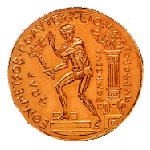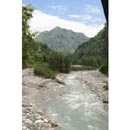
Reclamation Works
and
Water Resources Management
Department of Rural and Surveying EngineeringNational Technical University of Athens


Education
Undergraduate Courses
Fluid Mechanics and Applied Hydraulics (5th Semester)
Basic characteristic properties of fluids. Hydrostatics. Kinematics. Fundamental equations of fluid mechanics. General equations for conservation of mass, momentum, and energy. Real and ideal fluids. One-dimensional equation of conservation of mass, momentum and energy. Laminar flow in pipes. Boundary layer theory. Coefficient of friction. Darcy-Weisbach equation and Moody diagram. Basic principles and applications in steady flow in closed conduits under pressure. Introduction to uniform flow in open channels. Specific energy. Characterization of flow regarding criticality. Froude number.
Engineering Hydrology (7th Semester)
Introduction to Hydrological Processes. Elements of Geomorphology. Statistical Analysis of Hydrological Information. Measurement and Analysis of rainfall and snow data. Hygrometry: Networks and Data analysis. Floods. Routing through reservoirs of stream sections. Meteorological and Hydrological analysis.
Hydraulic Works (8th Semester)
Analysis of flow in closed conduits. Municipal water supply: Demand prediction – Water quality. Resrvoir design. Water supply network design and technology. Urban drainage networks design and management. Principles of operation and maintenance. Elements of other hydraulic works.
River Engineering (9th Semester)
Introduction. Flood hydrograph models. Properties of water and sediment. Bed forms of alluvial streams. Velocity distribution. Bed roughness-shear stress. Sheet erosion. Universal Soil Loss Equation. Sediment discharge. Bed-load transport and suspended load transport equations. Einstein’s theory. Computation of a non-eroded stream. Channel rectification techniques-Flood protection measures.
Reclamation Works (8th Semester)
Introduction. Soil water- crops -atmosphere continuum. Irrigation water quality. Estimation of irrigation needs. Irrigation methods. Design discharges for irrigation systems. Sprinkler irrigation. Water Hammer-Protection measures. Irrigation canals. Drainage theory and drainage systems.
Open-Channel Flow and Hydraulic Structures (6th Semester)
Introduction. Saint-Venant equations. Uniform flow. Non-uniform gradually varied flow: Computation of flow profiles. Hydraulic jump. Hydraulic structures: transitions, spillways, gates, drop structures, stilling basins, culverts, bridge piers.
Groundwater Hydrology (8th Semester)
Introduction. The role of groundwater aquifers and their significance in water resources management. Classification of groundwater aquifers. Hydraulic parameters of porous media and groundwater aquifers. Darcy’s law. Dupuit assumptions for phreatic aquifers. Inhomogeneity and anisotropy. Continuity equation and fundamental equations of flow in groundwater aquifers. Initial and boundary conditions. Methods of solution in special cases using analytical approaches. Hydrologic maps and flow nets. Well hydraulics and pumping tests. Solution of governing equations using finite differences. Artificial recharge and evaluation of aquifer capacity.
Engineering Ecology (3rd Semester)
Basic ecological concepts: organization at the level of organisms, populations and ecosystems. Flow of energy – circulation of chemical substances. Land and water ecosystems. Mathematical models. Humans and the environment. Alternations of environment and environmental consequences. Water pollution, atmospheric pollution and car noise. Technologies and policies for pollution control. Special topics and engineering applications.
Sanitary Engineering (8th Semester)
Basic concepts of chemistry and microbiology of water. Basic types of wastes and their consequences to the environment. Disposal of wastes to water receivers and assimilative capacity of receivers. Ground disposal. Wastewater treatment methods. Usual types of treatment for urban and agricultural wastes.
Water Resources Management (Term Paper) 9th Semester
Estimation and forecasting of water needs for various uses of water. Hydrologic analysis of a water catchment. Estimation of surface and groundwater resources. Schematization of a system of water resource management. Optimal selection of projects and measures for a catchment. Optimal use of water resources using various optimization techniques.
Graduate Courses
The faculty members of of our Laboratory participates in two interdisciplinary graduate programs of studies at the National Technical University of Athens.
The first program is titled "The Science and Technology of Water Resources" and is organized together with the departments of Civil, Rural and Surveying Engineering, Mining Engineering and Metallurgy and Applied Sciences. The faculty members of our laboratory participate in the teaching of the following courses
![]() Water Resources Management
Water Resources Management
![]() Advanced Groundwater Hydraulics
Advanced Groundwater Hydraulics
![]() Irrigation and Drainage Engineering
Irrigation and Drainage Engineering
The second program is titled "Environment and Development" and is organized together with the departments of Rural and Surveying Engineering, Civil Engineering, Architecture Engineering, Mechanical Engineering, Chemical Engineering, Electrical and Computer Engineering, Mining and Metallurgical Engineering .